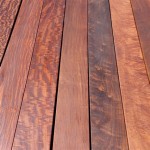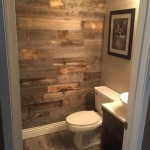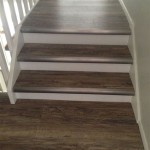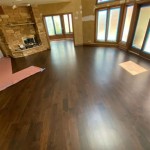Is Vinyl Flooring Good For Bathrooms?
Vinyl flooring has become increasingly popular for bathrooms due to its durability, water resistance, and affordability. But is it the right choice for your bathroom? Here's a look at the pros and cons of vinyl flooring in bathrooms to help you make an informed decision:
Pros of Vinyl Flooring in Bathrooms
1. Waterproof and Water-Resistant:Vinyl flooring is known for its excellent water resistance. It's made from a combination of PVC and other materials, creating a waterproof barrier that prevents water from seeping through the flooring. This makes it ideal for bathrooms, where water spills and humidity are common.
2. Durable and Long-Lasting:Vinyl flooring is incredibly durable and can withstand heavy foot traffic and wear and tear. It's resistant to scratches, dents, and abrasions, making it a great option for frequently used bathrooms.
3. Easy to Clean and Maintain:Vinyl flooring is easy to clean and maintain. Regular sweeping or vacuuming and occasional mopping with a mild cleaning solution will keep it looking its best. Its non-porous surface prevents dirt and grime from penetrating, making cleanup a breeze.
4. Comfortable and Warm:Unlike some other flooring options, vinyl flooring offers a comfortable and warm feel underfoot. It's slightly cushioned, providing a pleasant sensation when walking or standing on it, and it can also help reduce noise levels.
5. Affordable and Versatile:Vinyl flooring is relatively affordable compared to other bathroom flooring options. It comes in a wide range of styles, colors, and textures, allowing you to match it with any bathroom décor.
Cons of Vinyl Flooring in Bathrooms
1. Potential for Fading:Although vinyl flooring is durable, it can be susceptible to fading over time, especially in rooms with direct sunlight. This is because the color pigments in the flooring can break down when exposed to UV rays.
2. Can Be Slippery:Vinyl flooring can become slippery when wet, especially if it has a high-gloss finish. This can pose a safety hazard in bathrooms, particularly for older individuals or those with mobility issues.
3. Limited Environmental Friendliness:Traditional vinyl flooring is made from PVC, which is a petroleum-based material. This makes it less environmentally friendly than some other flooring options such as bamboo or cork.
4. Not Biodegradable:Vinyl flooring is not biodegradable, meaning it cannot be broken down naturally by microorganisms. This can be a concern for those who are environmentally conscious.
5. Off-Gassing:New vinyl flooring may emit volatile organic compounds (VOCs) as it settles. These gases can be harmful to indoor air quality, so it's important to ensure proper ventilation during and after installation.
Conclusion
Vinyl flooring can be an excellent choice for bathrooms, offering water resistance, durability, ease of maintenance, and affordability. However, it's important to consider the potential for fading, slipperiness, and environmental concerns before making a decision. If these factors are not a concern for you, then vinyl flooring can be a great way to achieve a beautiful and functional bathroom.

What Is The Best Flooring For Bathrooms Tarkett

Luxury Vinyl Flooring Is A Great Choice For Chic Bathrooms

Luxury Vinyl Flooring What Is It And Any Good Melanie Lissack Interiors

Vinyl Planks In Bathrooms Residential Inspiration Flooring

The Best Modern Bathroom Flooring Carpet Call

Can Vinyl Flooring Be Used In A Bathroom Hallmark Floors

Best Bathroom Flooring Options

Is Vinyl Plank Flooring Good For Bathrooms Chestnut

5 Pros And Cons For Installing Vinyl Flooring In Bathroom

Dos And Don Ts For Installing Vinyl Plank Floors In The Bathroom Advice Homeowners
See Also







